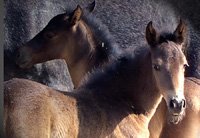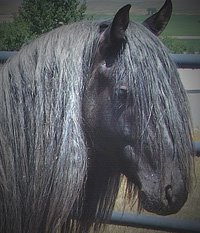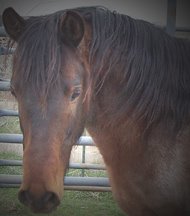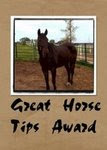When Travis and I were newly acquainted with the Barb horse, we spent a great deal of time at Quien Sabe Ranch, fountainhead of Robert Painter's efforts to preserve the ancient breed. One of the first things I learned there was how little I knew. My own childhood of lesson stables and country rides paled in comparison to Painter's seventy years among the horses. Not only did he have years on me, he also had countless hours of experience with unhandled horses.
Once recognized as the equine expert among my peers, I found myself utterly unprepared to work with the Painter herd. Oh, I knew how to tack up, pick hooves, sidepass and serpentine, apply splint boots and clip fetlocks. I understood cross-tie safety, stall mats, scratches, and colic symptoms. I could clean stalls, apply linament, post on the correct diagonal, and choose supplements...none of which did me any good amidst a herd of horses as yet untouched by human hands.
Compounding my uncertainty was the increased awareness of mortality that comes with age. Since the horse-keeping days of my youth, I'd suffered enough injuries to be relieved of the notion that "it won't happen to me." Barbs are not large horses, but they are possessed of an indefinable presence, an energy that is at once impressive and intimidating. I shocked myself -- a lifelong horse lover -- by reacting with fear.
Afraid of being stepped on or knocked over by the hot-blooded, unpredictable, nervous horses, I moved timidly in their presence. I stood with my feet well back from their hooves, touched their skins lightly so as not to startle them. Such treatment only served to make them more afraid, so progress was slow.
Most disheartening of all was Robert Painter's declaration that, "Very few people can start these horses."
What little confidence I had left all but dissolved in the wake of those words. After Travis and I left Quien Sabe, I lay awake many nights wondering how I, who had never worked with anything but truely "domestic" horses, could possibly gentle the seven precious, exquisitely sensitive, virtually wild Barbs in my pasture -- let alone train them for endurance competition.
There was nothing for it but to try. I read every website and book I could find about horse training. I attended equine expositions to compile the wisdom of various trainers. More than once, I left these expos in tears of despair. So many horses that couldn't touch my Barbs in quality, but whose training made them fit to present and promote! So I studied longer, harder, and meanwhile Travis and I struggled to scrape together enough cash for a round corral.
We also bought another horse -- a four year old Arabian named Aaruba Sunsette. The idea was to give me a practice horse, a gentled but unfinished project on which to hone my training skills before starting on the higher stakes Barbs that, Painter had convinced me, could be ruined by a single wrong move.
Unfortunately, my confidence was so low that I was anxious even around Aaruba. Though I knew he was accustomed to handling -- I'd seen his previous owner stand behind him and tug on his tail in a bizarre effort to catch him in a small space, an action that didn't seem to disturb Aaruba in the slightest -- fear still choked my efforts to train him. Young and emotional, he came with a thirty day start under saddle and a reputation for bolting when mounted. More than once, I primed myself for a training session with half a shot of vodka.
While I certainly don't recommend mixing alcohol with equestrian activities, I will admit those shots of liquid courage help set me on the road to recovery. They quieted my nerves sufficiently that I could quiet my horse.
You see, it never occurs to a horse that his handler's fear might be of the horse himself. As a prey animal, a horse's response to anxiety among his fellows is critical to survival. When I --the herd leader -- am afraid, I communicate to my horse that his anxiety is justified.
Attempts to conceal nervousness from a horse are rarely effective. Horses are too perceptive, too well attuned to the dilation of pupils and speeding of pulse, to be fooled by false confidence. Fortunately, I find that I can that I can trick my own body into releasing tension. Consciously relaxing my shoulders and sighing deeply goes a long way toward soothing my mind, which in turn soothes my horse. (These actions also work well when I'm not nervous, but my horse is.)
Vodka notwithstanding, the best tonic for handler anxiety is experience. After two years of spending several hours each day among my Barbs, I rarely worry anymore that a horse, even an ungentled one, will step on or into me. I now prefer to stand so close to them that their shoulders warm my chest as I rub their trembling necks, for I know this comforts them. I trust my instincts and have conditioned myself to remain calm regardless of my horse's emotional level.
Ironically, Aaruba has proven the most challenging member of my herd. He's flightier than the Barbs, less practical, more prone to losing focus in moments of stress. Indeed, the Barbs are positively easy to train by comparison.
To be fair, I believe Robert Painter based his discouraging pronouncement that "very few people can start these [Barbs]" on bad experiences with cowboy-style "trainers" who believe dominating a horse is more important that understanding it. It is true that Barbs generally have too much courage to allow themselves to be manhandled. Rather than submitting to rough handling, a Barb will fight back. Fairly treated, however, he will respond with uncommon loyalty and intelligence to match.
But what is so difficult about that? I've done my research, and it has paid off. I understand things now that I never needed to understand back in
 my days of working with domesticated horses. I've learned how horses think, learned to speak their language rather than waiting on their attempts to learn mine. I've learned that horses are the embodiment of their own emotions, all honesty and prey and will to survive.
my days of working with domesticated horses. I've learned how horses think, learned to speak their language rather than waiting on their attempts to learn mine. I've learned that horses are the embodiment of their own emotions, all honesty and prey and will to survive.Whether that makes me one of the "very few," I don't know. But, I can tell you this: In empathizing with my Barbs, I forget to worry about myself.
...and I can start these horses.
______________________________
Want to read more posts like this one? We deliver!









3 comments:
*Clapping* This is an excellent post! I am so glad to hear you speak confidently of your abilities. You are a wonderful horsewoman, and I consider you on par with my mother.
So true! Always enjoy your insights.
Now that, Crys, is praise to bring tears to my eyes. I carry few regrets around with me (who needs the extra weight?), but I do wish I hadn't been to shy to pick your mother's brains about horses. She could have taught me much.
Post a Comment